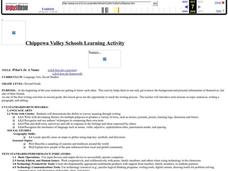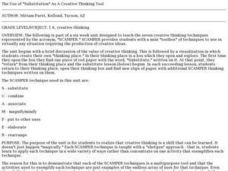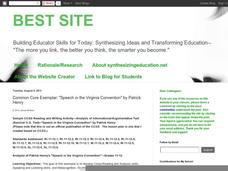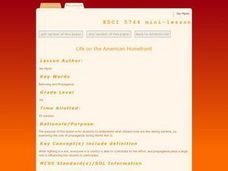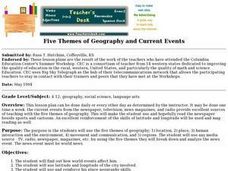Curated OER
What's In A Name
Second graders write a paragraph about their findings on what their name represents. In this writing lesson plan, 2nd graders will research their name and why they were named that. They will draw a picture that represents them along with...
Curated OER
Respecting Diversity
Middle schoolers explore the concept of philanthropy. In this service learning lesson, students read and respond to The Sneetches by Dr. Seuss. Middle schoolers discuss self-respect and respect.
Curated OER
A Scientific Approach to Teaching about Evolution
Students examine fossils and analyzing their significance in relation to theories of evolution. Hand-outs are provided. This lesson could be supplementary to a broader unit on evolution or geology.
Curated OER
The Use of Substitution As a Creative Thinking Tool
Students practice using substitution as a creative way of thinking about writing and try to substitute song lyrics, food items, rhythm movements and more. In this substitution lesson plan, students create a new candy, and create...
Curated OER
Women's Involvement In The Progressive Era
Students participate in a lesson that is investigating the Progressive Era of history. They conduct research focusing on the role of women in era. The information provides the perspectives necessary to address the popular stereotypes...
Curated OER
The Natural Selection of Bean Hunters
Students, in groups, hunt for beans placed in the lawn. Each group uses a different tool (hand, spoon, fork, etc.) and there are three different colors of beens.
Curated OER
Theory, Theory, Who's got the theory?
Students analyze 5 separate theories of evolution in order to help them explain the different meanings of theory, how human values influence science, and that the scientific view of the origin of life does not involve supernatural forces.
Appalachian State University
Literacy Genres
Expand on eager bookworms' independent reading by engaging them to define various genres of literature. Readers collaborate and use technology to find what goes into their assigned or previously read genres. Time is given for independent...
Curated OER
W.A.R. (Wars Are Real)
Eighth graders research America's involvement in wars and conflicts throughout its history. They are assigned a specific war or conflict and then research basic facts and what society was like in the era of their research. They present...
Curated OER
Speech in the Virginia Convention
“. . .different men often see the same subject in different lights. . .” but the great orator Patrick Henry used all the skills at his command to craft a speech to convince listeners to see things as he did--that liberty was worth dying...
Curated OER
Life on the American Homefront
Seventh graders examine the conditions of the homefront during World War II. Using propaganda, they discuss its role and how it affected people who viewed it. They identify the role citizens played during the war and create their own...
Curated OER
Five Themes of Geography and Current Events
Basically, pupils look for a current world event from a reputable source and identify the five themes of geography within it. Throughout the school year, they keep a notebook of these current events. A grading guideline is outlined, and...
Curated OER
KWANZAA
Students study about Kwanzaa, an African-American celebration established in 1966 by Dr. Maulana, and also participate in some traditional activities.
Curated OER
What is a Successful Reader?
Young scholars identify and discuss characteristics of "successful reader," describe what goes on in their minds while they read various texts, and explain through presentation techniques that readers use to comprehend text.
E Reading Worksheets
E Reading Worksheets: Tone Worksheets and Lessons
This learning module provides remediation and extra practice with identifying an author's tone. Reinforcement for understanding author's tone is provided through the five different worksheets and a mini-lesson. CCSS.ELA-Literacy.CCRA.R.4
